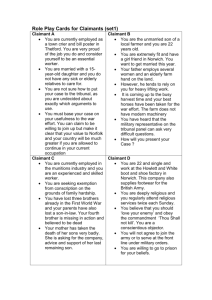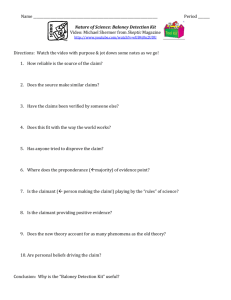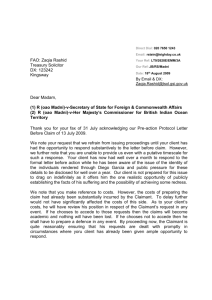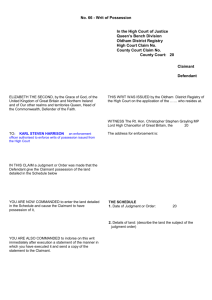PAST RELEVANT WORK: SSD/SSI Claims
advertisement
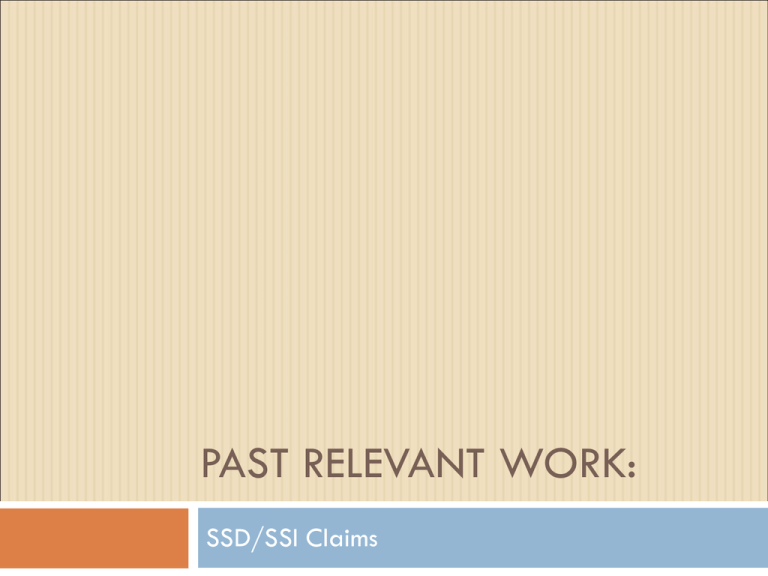
PAST RELEVANT WORK: SSD/SSI Claims Presenter: Mike Miskowiec, Esquire www.miskowieclawoffice.com THE SEQUENTIAL EVALUATION PROCESS 20 C.F.R § 404.1520; 416.920 (i) At the first step, we consider your work activity, if any. If you are doing substantial gainful activity, we will find that you are not disabled. (ii) At the second step, we consider the medical severity of your impairment(s). If you do not have a severe medically determinable physical or mental impairment that meets the duration requirement in § 404.1509, or a combination of impairments that is severe and meets the duration requirement, we will find that you are not disabled. (iii) At the third step, we also consider the medical severity of your impairment(s). If you have an impairment(s) that meets or equals one of our listings in appendix 1 of this subpart and meets the duration requirement, we will find that you are disabled. (iv) At the fourth step, we consider our assessment of your residual functional capacity and your past relevant work. If you can still do your past relevant work, we will find that you are not disabled. (v) At the fifth and last step, we consider our assessment of your residual functional capacity and your age, education, and work experience to see if you can make an adjustment to other work. If you can make an adjustment to other work, we will find that you are not disabled. If you cannot make an adjustment to other work, we will find that you are disabled. The Problem of the Obsolete Job: Inability to Perform Past Relevant Work Must be Due to a Severe Impairment Pass v. Chater, 65 F.3d 1200 (4th Cir. 1995) proof that claimant’s former job as a gate guard no longer exists does not preclude a finding that claimant can still perform his past relevant work; proof that claimant cannot perform job as a gate guard as it is performed in the national economy does not preclude finding that he can still perform his past relevant work if he can still perform his past relevant work as he performed it. Garcia v. Secretary, 46 F.3d 552 (6th Cir. 1995) Commissioner need not show that past relevant work exists in significant numbers in the national economy to deny a claim based on claimant’s continued ability to perform past relevant work. Barnhart v. Thomas, 540 U.S. 20, 124 S.Ct. 376, 157 L.Ed.2d 333 (2003), if claimant can still physically and mentally perform past relevant work, not disabled. Commissioner need not consider whether past relevant work exists in significant numbers in the national economy. What’s my line? Deloatche v. Heckler, 715 F.2d 148 (4th Cir. 1983) Administrative Law Judge must consider the claimant’s testimony concerning the exertional and nonexertional demands of her job. While description of job in Dictionary of Occupational Titles presumptively apply to claimant’s job, “[t]he claimant may overcome the presumption that the Secretary's generalization applies by demonstrating that her duties were not those envisaged by the framers of the Secretary's category. Smith v. Heckler, 782 F.2d 1176 (4th Cir. 1986) Administrative Law Judge must give reasons for rejecting claimant’s testimony that shows that demands of his job are not same as that described in Dictionary of Occupational Titles. http://ssa.gov/OP_Home/rulings/di/02/SSR82-62-di-02.html Social Security Ruling 82-62 What is Past Relevant Work? SGA The adjudicative criteria for determining whether a person has done "substantial" and "gainful" work activity are explained in sections 404.1571-404.1575 and 416.971-416.975 of the regulations. See Boyes v. Secretary, 46 F.3d 510 (6th Cir. 1994). Duration Duration refers to the length of time during which the person gained job experience. It should have been sufficient for the worker to have learned the techniques, acquired information, and developed the facility needed for average performance in the job situation. The length of time this would take depends on the nature and complexity of the work. Recency Recency refers to the time which has elapsed since the work was performed. A gradual change occurs in most jobs in our national economy so that after 15 years it is no long realistic to expect that skills (or proficiencies) and abilities acquired in these jobs continue to apply. The 15-year guide is intended to insure that remote work experience which could not reasonably be expected to be of current relevance is not applied. DEVELOPING THAT PAST WORK WAS NOT “SUBSTANTIAL GAINFUL ACTIVITY” Detailed Earnings Report Work History Report (SSA-3369) Comprehensive interview with client FINDINGS REQUIRED TO DENY A CLAIM BASED ON ABILITY TO PERFORM PAST RELEVANT WORK A finding of fact as to the individual's RFC. A finding of fact as to the physical and mental demands of the past job/occupation. A finding of fact that the individual's RFC would permit a return to his or her past job or occupation

